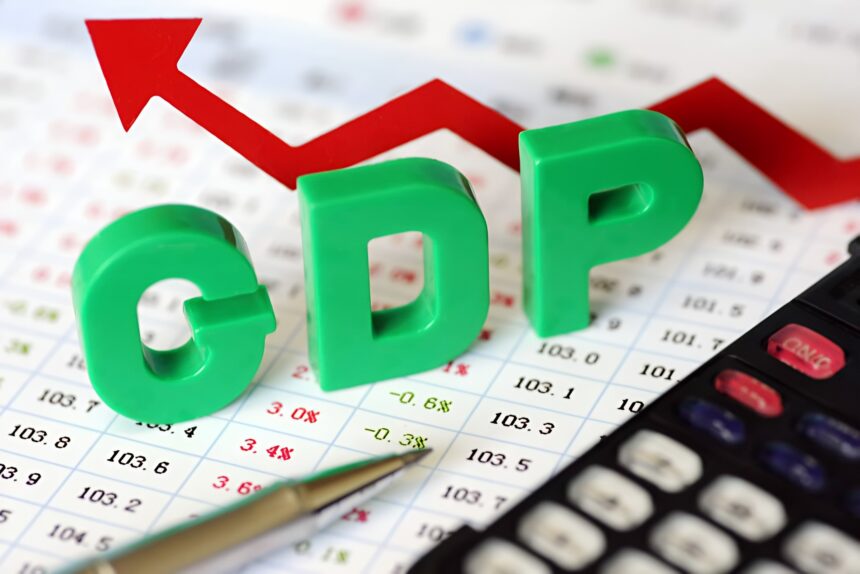Nigeria recorded a 4.23% GDP growth in Q2 2025, surpassing the 3.48% seen in the same period last year and the 3.13% in the first quarter of 2025.
The 4.23% GDP growth was revealed in the latest report issued by the National Bureau of Statistics (NBS) on Monday, September 22, 2025.
According to the NBS, the latest uptick is an indication that Nigeria is strengthening its industrial output and increasing oil production.
According to the bureau, the 4.23% GDP growth in Q2 was driven mainly by the industry sector at 17.31 percent compared to the corresponding quarter of 2024 at 16.79 percent.
The NBS report also highlighted how the non-oil sector, which accounts for 95.95% of total GDP, expanded by 3.64% year-on-year.
According to the report, the agriculture sector grew by 2.82 per cent in real terms during the period under review, an increase from the 2.60 per cent recorded in the second quarter of 2024.
The industry sector also showed strong performance, growing by 7.45 per cent, compared to 3.72 per cent in the corresponding period of the previous year. Meanwhile, the services sector recorded a real growth of 3.94 per cent, slightly up from the 3.83 per cent posted in the second quarter of 2024.
In nominal terms, aggregate GDP stood at N100.73 trillion in the second quarter of 2025, up from N84.48 trillion in the same period of the previous year, representing a nominal year-on-year growth of 19.23 per cent.
The NBS said in the report: “During the quarter under review, agriculture grew by 2.82%, an improvement from the 2.60% recorded in the corresponding quarter of 2024.
“The growth of the industry sector stood at 7.45% from 3.72% recorded in the second quarter of 2024, while the Services sector recorded a growth of 3.94% from 3.83% in the same quarter of 2024.
“This performance is higher when compared to the second quarter of 2024, which recorded an aggregate GDP of N84,484,878.46 million, indicating a year-on-year nominal growth of 19.23%.”
For the oil sector, the NBS reported that average daily crude oil production rose to 1.68 million barrels per day, which is 0.27 million barrels higher than the 1.41 million barrels per day recorded in Q2 2024.
It also marked an increase from the 1.62 million barrels per day reported in the first quarter of 2025.
This increase in production translated to a real GDP growth of 20.46 per cent in the oil sector, up significantly from 10.08 per cent recorded in the same quarter of 2024, and a substantial jump from the 1.87 per cent posted in Q1 2025. The sector contributed 4.05 per cent to total GDP in the second quarter of 2025, compared to 3.51 per cent in Q2 of the previous year.
“The real growth of the oil sector was 20.46 (year-on-year) in Q2 2025, indicating an increase of 10.38% points relative to the rate recorded in the corresponding quarter of 2024 (10.08%).
“Growth increased by 18.59% points when compared to Q1 2025, which was 1.87%. On a quarter-on-quarter basis, the oil sector recorded a growth rate of 6.01% in Q2 2025.
“The Oil sector contributed 4.05% to the total real GDP in Q2 2025, up from the figure recorded in the corresponding period of 2024 at 3.51%,” the NBS added.
During the preceding quarter, the oil sector contributed 3.97 percent.
Similarly, the NBS reported that mining also contributed to the 4.23% GDP growth in Q2 2025.
The mining sector was said to grow by 20.86 per cent in real terms, supported by a 50.41 per cent increase in quarrying and other minerals, and a 32.59 per cent rise in coal mining.
The sector’s overall contribution to GDP rose to 4.23 per cent in Q2 2025, up from 3.64 per cent in the same quarter of 2024.
For the non-oil sector, the NBS reported steady progress, growing by 3.64 per cent in real terms in the second quarter of 2025.
This represents an increase from the 3.26 per cent posted in the corresponding period of 2024, and also is higher than the 3.19 per cent growth posted in the first quarter of the year. Growth in the non-oil sector was largely driven by positive activity in agriculture (crop production); information and communication (telecommunications); real estate; financial and insurance (financial institutions); trade; construction; and electricity, gas, steam, and air conditioning supply.
Despite the growth, the non-oil sector’s share of real GDP declined slightly, contributing 95.95 per cent in Q2 2025, down from 96.49 per cent in the same period of 2024 and lower than the 96.03 per cent reported in the first quarter of 2025.
The NBS stated that the overall economic performance reflected stronger activity across key sectors, with notable gains in oil production and industrial output supporting the country’s growth trajectory.





